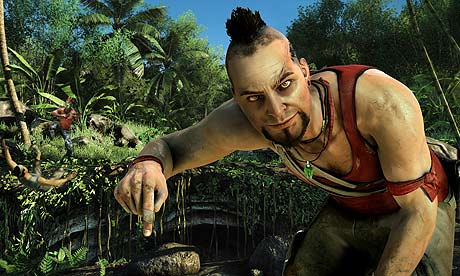I'm beginning to think that Far Cry 3 may be my perfect game. I don't mean the perfect game for everyone – that's obviously Portal 2. I just mean for me, and by extension, a lot of other people who've spent their whole lives playing computer games. And this is why.
It makes you feel clever without actually demanding too much from you. Wait, I don't mean that it's good because its easy, that would be appalling; I mean that the systems are nicely telegraphed for the type of game that Far Cry 3 is. Missions are open enough so that you can approach enemy compounds in lots of different ways, and really develop your own cogent set of tactics (I use a LOT of rocks, my version of Jason must have a throwing arm the size of a tree trunk). But the areas in which the action take place are reasonably confined and self-evident, and loaded with useful scenic appliances, and there are rarely time pressures so you can watch the same guard complaining about the heat for 20 minutes if you like.
Freedom within recognisable constraints is the perfect game state - it is textbook design. Far Cry 2 messed this up because everything was so big and soooo far apart, and the systems grinded against each other. Narrative and ludology constantly bickered and occasionally fought, and when the player stepped in and said 'stop it guys, it's not worth it' something bad would usually happen. Far Cry 3 is a regimented democracy in which the aristocracy (the missions) live in benign separation from the proletariat (the open island) everyone knows their place. And there in the background, facilitating the interplay between the two, is the great fast travel system, which lets you gather resources for a mission without having to drive around for hours in a jeep. Exploration is always, always, on your terms.
I love the way that the progress page tells you everything you're going to have to do or find in the game. The exact number of missions, side-quests, relics, everything is listed here, so I know without ambiguity what is required of me to complete the game. This is good because, I am very suspicious of the way most fantasy RPGs couch this stuff in secrecy - although games like Skyrim do retain a mission structure, I don't know how many missions there are or how vital some of the side tasks might be, and I'm constantly worried I'm leaving vast tracts of the experience untouched. I like to know exactly what I'm going to achieve in a gaming session, I want to know I've made quantifiable progress. Far Cry 3's stats page tells me.
But conversely, while a lot of fans will say about a new adventure title, "amazing, it's got at least 100 hours gameplay", I'll be thinking "oh god, 100 hours of gameplay?!". I recognise the importance of value and the concept that there is a vast experience to be had, but if I see the words 100 hours of gameplay, I'm thinking that I probably should spend at least half of those playing with my kids, or putting a load in the washing machine or fixing that bloody shower curtain. Again, it comes down to that peculiar quality of freedom within parameters. "Mankind cannot bear too much reality," wrote TS Elliot in the Wasteland - I'm like that with gameplay hours. And here's the beauty of Far Cry 3's progress page again - it tells me what I have to do, but not how long it's going to take me. Progress is on my terms. I might spend 100 hours playing that game, but they will be 100 productive hours within a holistic network of systems that I understand. Commitment is always, always, on your terms.
The progression system reflects this sense of choice within recognisable limits. There are three different types of power-up I can get, and each has a set number of possibilities - I know that because their icons are displayed on screen whenever I want to learn a new skill. Also, the crafting system provides a very logical and understandable series of tasks. You want to carry more cash? You need a bigger wallet. You want two guns? Fine, make a holster. Those are your options. In a fantasy RPG, I'll probably have 75 wallets to choose from, each with very specific qualities. Do I go for the Pouch of Feglorek which gives me +10 on loose change, but won't hold my Am Ex card, or do I opt for the Purse of Hhgstya, which has a hidden section for magical dollars and also repels trolls? I just want a fucking wallet.
Far Cry 3 also has a PG-13 approach to consequence - i.e. it only contains mild peril. If you're killed, it's no big deal, you can save regularly in the open world and missions have lots of check points. However, if you ARE good and don't keep dying or alerting all the guards, you are rewarded with extra XP. It's the carrot rather than the stick approach to game motivation - and the carrot is always best, even when it is disguised as a stick (you're a genius Miyamoto).
This freedom from anxiety allows you to actually enjoy the great death sequences, which is something Far Cry 3 has in common with all the best violent games, from Mortal Kombat to Grand Theft Auto. A couple of years ago, I wrote a feature on game design for The Observer in which I quoted research from the Helsinki School of Economics' Mind Lab. They discovered that dying in a game – as long as it's the player's own fault and isn't too costly – actually triggers a pleasure response in the brain, because it re-affirms your agency in the world (you can read a bit more about it here). And Far Cry 3 is full of funny deaths. For example, I have died trying to drop from a hang glider onto the top of a radio mast (has anyone done this? Is it possible?); I have also been gored to death by wild boars, and I died while trying to ride a quad-bike over an almost vertical cliff face. Each death has bought me vital lessons about the game world, each has brought the physical boundaries into greater clarity. Apart from the boars one, that was just stupid.
And everything else just works: shooting is fine, cover is fine, driving is fine. The script is okay, the acting is pretty good. None of it is going to win awards, but it's all functional and doesn't yank you out of the experience every five minutes. Even the quaint repetitions are acceptable. I like the fact that every time I return to Amanaki village, there's that guy telling his wife about the totally wicked pig he just hunted (at least I think that's what's going on); I like that the woman in the general store is always reminding me to unscramble the radio masts so she can get supplies from the remote villages, because those guys have amazing weapons (why do people in remote villages have amazing weapons? I don't know, there are no conversation trees – thank god). This stuff is unobtrusive enough to remind me of classic role-playing games in which NPCs were just ciphers of information bobbing on the spot like novelty toys in the back window of a car. Those are nice memories. I don't mind.
Most of all Far Cry 3 offers choice on the player's terms. If I decide I want to spend an hour hunting goats because I want to craft a better holster, I can do that, and the chances are, I'm not going to be forced into a side-quest by some frantic NPC waving his hands and making a big fuss and scaring all the goats away. There are little tasks to do if you feel like it, but they lurk in the background.
And this is what it all comes down to. Most open-world game systems are extroverts, they want your attention, they're constantly chucking stuff at you, loads of stuff, all the time. Sleeping Dogs doesn't make you feel clever it makes you feel like a thug-for-hire in a city of insane, demanding maniacs; Grand Theft Auto IV is amazing but boy does it want you to do lots of stuff right now, RIGHT NOW! Come on! Answer your goddam phone!
Far Cry 3's freedom mechanic is an introvert – it makes itself available, but doesn't shout in your face like a systemic Al Pacino. Instead, it whispers in your ear, like an experienced statesman. "Oh, you want to have a look around? Go right ahead – here's a little reminder of your current mission in the corner of the screen, but yeah sure, ignore it; oh wait, here's a medical run you can do... oh what? You're trying to kill a tiger with a sub-machine gun? That's fine, dude, I'll be here when you're finished. Just in case..." Diversion is always, always, on your terms.
I have to admit it, I'm only about halfway through so maybe there are some unpleasant shocks coming my way. But I doubt that will happen. Introverts don't set out to shock you; but they'll often put you in positions where there's danger and peril, and they'll say, "I told you so". Ah yeah, I'll think, I've learned that now. And I did it myself. Thanks introverted game design!
We are heading into an era where systems will have to govern actions; where games will be too vast to script. How game designers treat emergent encounters and freeform mission structures is going to shape the next decade of interactive entertainment. So I'm saying, let's make more introverted game systems; let's let the player decide, let's facilitate rather than dictate freedom. True, man cannot bear too much reality, but man also doesn't like being shouted at by over-excited NPCs. At least this one doesn't.




Comments (…)
Sign in or create your Guardian account to join the discussion